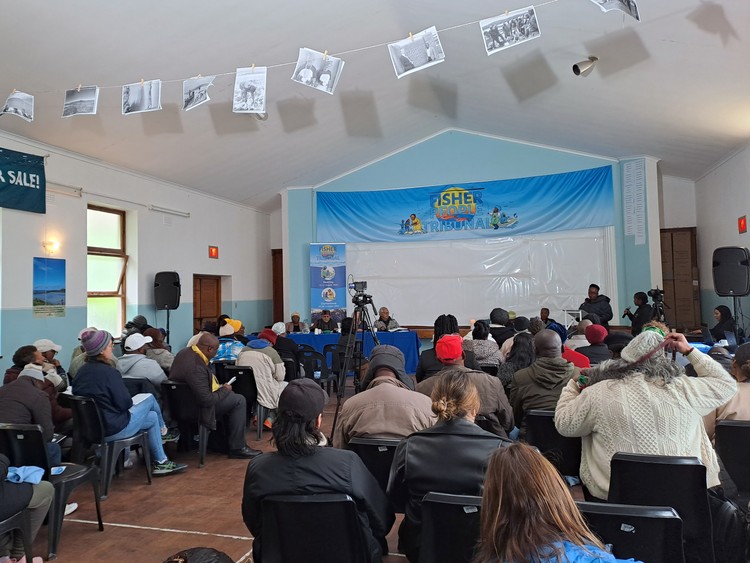Stop new mining on West Coast, say fishers
“We depend on the ocean”
Masifundise Development Trust and Coastal Links hosted the Fisher People Tribunal from 12 to 14 August. Small-scale fishers from across the country gathered in Kalk Bay to share testimonies. Photo: Liezl Human.
The amount of fish in the Olifants River and the ocean nearby has decreased over the years while mining on the West Coast has increased, says Salvester Don, a small-scale fisher from Ebenhaeser and Papendorp at the mouth of the Olifants River.
“It became visible … our communities began to suffer,” Don told the three-day Fisher People Tribunal in Kalk Bay, Cape Town this week. The tribunal was hosted by the Masifundise Development Trust and Coastal Links. Small-scale fishers from across the country testified about issues faced by their communities.
At the tribunal, West Coast small-scale fishers called for a moratorium on any new mining activity or offshore oil and gas activity until the impacts on fishers, their livelihoods, and the environment are considered by the government. They also called for mining activities to not restrict further access to the ocean.
They want the Department of Forestry, Fisheries and the Environment (DFFE) and the Department of Mineral Resources and Energy (DMRE) to meaningfully engage with them about the implementation of the small-scale fishing policy and new mining or oil and gas projects planned on the West Coast.
Over the course of three days, six cases from different small-scale fishing communities were presented to a “jury” of experts. A “charge sheet” was presented and testimonies were delivered by fishers from the affected communities. Cases presented raised issues with the implementation of the small-scale fishing policy, the lack of recognition of inland fisheries at the Gariep Dam, and the devastating effect of the KwaZulu-Natal floods on small-scale fisher women, among others.
On Wednesday, West Coast fishers testified about their restricted access to the oceans because of mining activity. They also raised concerns about future offshore oil and gas projects on the West Coast, and the massive Boegoebaai green hydrogen project close to Alexander Bay.
Walter Steenkamp, a fisher from Port Nolloth, added his concerns to those of Salvester Don. He said that some fishers are treated like criminals for fishing in areas where access is restricted.
“We depend on the ocean,” said Steenkamp, who said he has been fishing for nearly four decades.
He said fishing communities had not been consulted about the planned Boegoebaai green hydrogen project, and raised concerns about the impact of oil and gas exploration on the West Coast. Steenkamp said that “it’s not that we’re against development” but fishers believe they are being sold out.
He also accused the prospecting companies of causing conflict and division in communities.
Jury member Makoma Lekalakala, the Director of Earthlife Africa, addressed the fishers and stressed the importance of “build[ing] power from below”. Lekalakala said the problem is that “people are not part of decision-making” when it comes to their livelihoods.
The tribunal will be followed up with a conference in October where small-scale fishers will discuss strategies.
According to the organisers the jury included: Makoma Lekalakala, the Director of Earthlife Africa; Emeritus Professor Ben Cousins, founder of the Institute of Poverty, Land and Agrarian Studies (PLAAS) at the University of Western Cape (UWC); Andy Johnston, an activist who has been a fisher for 50 years; Professor Uche Ewelukwa Ofodile professor at the University of Arkansas School of Law; Miloon Kothari, a human rights expert who has formerly served as the United Nations Special Rapporteur on adequate housing; Gianni Tognoni, the general secretary of the human rights organisation the Permanent Peoples’ Tribunal; and Paula Satizabal, a Colombian activist and postdoctoral fellow at the Helmholtz Institute for Functional Marine Biodiversityat the University of Oldenburg, Germany.
We asked for a response from the DFFE and DMRE which will be added once received.
Support independent journalism
Donate using Payfast

Don't miss out on the latest news
We respect your privacy, and promise we won't spam you.
Next: Man suspected of raping a disabled child is at large after police bungle arrest
Previous: Homeless people removed from Cape Town’s city centre
© 2024 GroundUp. This article is licensed under a Creative Commons Attribution-NoDerivatives 4.0 International License.
You may republish this article, so long as you credit the authors and GroundUp, and do not change the text. Please include a link back to the original article.
We put an invisible pixel in the article so that we can count traffic to republishers. All analytics tools are solely on our servers. We do not give our logs to any third party. Logs are deleted after two weeks. We do not use any IP address identifying information except to count regional traffic. We are solely interested in counting hits, not tracking users. If you republish, please do not delete the invisible pixel.

